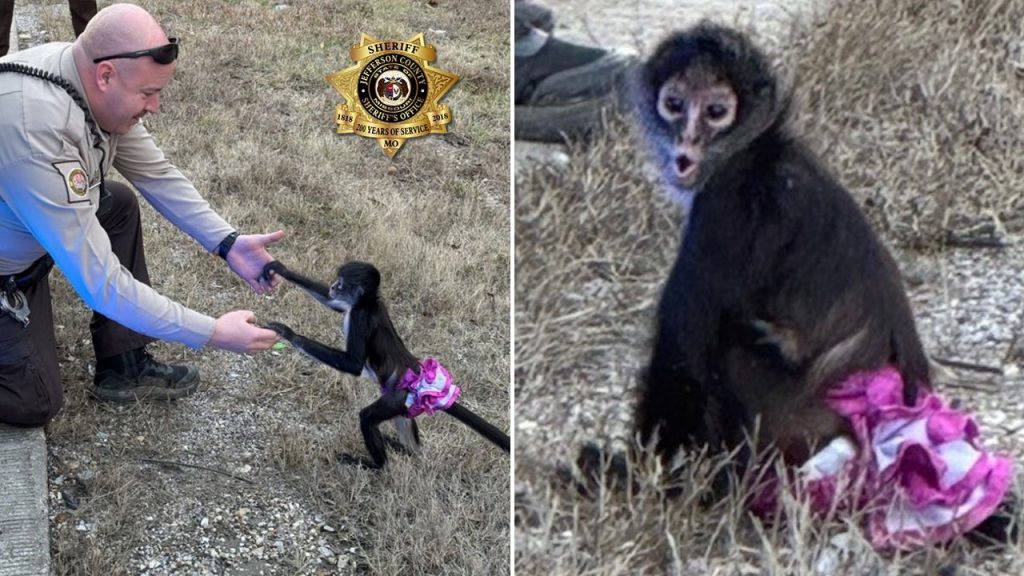A Primate in Pink: Missouri Deputies Handle Unexpected Encounter with Tutu-Clad Spider Monkey
The Jefferson County Sheriff’s Office in Missouri faced an unusual call on Monday when reports came in of a subject "monkeying around" near Route 21 and Highway M. Responding deputies arrived to find a spider monkey, typically a resident of Central and South American tropical forests, sporting a pink tutu and little else. This unexpected encounter prompted a humorous response from the Sheriff’s Office on social media platform X, formerly known as Twitter, describing the situation as "bananas" and the monkey as "naked except for what appeared to be a tutu." Deputies successfully apprehended the primate after careful negotiations, bringing the "bananas situation" under control without incident. The monkey, which had escaped from a nearby residence, was safely returned to its caretaker.
Beyond the Humor: A Testament to Law Enforcement Adaptability and Responsible Pet Ownership
While the incident generated amusement and lighthearted commentary, the Sheriff’s Office underscored the unpredictable nature of law enforcement work, emphasizing the need for officers to be prepared for any situation. The officers involved demonstrated commendable adaptability and resourcefulness in handling this unusual call, ensuring the safety of both the monkey and the public. The incident also highlights the importance of responsible exotic pet ownership, particularly in ensuring secure enclosures to prevent escapes. Owning a spider monkey in Missouri requires a permit, indicating a regulatory framework intended to ensure responsible care and prevent such incidents.
A Series of Monkey Business: Similar Incidents Across the US
This incident in Missouri follows a recent trend of unusual monkey encounters across the United States. Just days prior, a spider monkey clad in a onesie was discovered by California Highway Patrol during a routine traffic stop for excessive speeding. In another incident in November, 43 rhesus macaque monkeys escaped from a testing facility in South Carolina, highlighting the challenges of containing primates in various settings. These incidents collectively raise questions about the adequacy of regulations and safety protocols surrounding primate ownership and research facilities.
The Allure and Challenges of Exotic Pets: Balancing Individual Liberties and Public Safety
The increasing prevalence of exotic pets, including primates, presents complex challenges for both law enforcement and animal welfare organizations. While some individuals are drawn to the unique appeal of owning such animals, the potential for escapes and the inherent risks associated with primate behavior necessitate stringent regulations and responsible ownership practices. Balancing individual liberties with public safety remains a central concern in managing the ownership of exotic animals.
Spider Monkeys: A Closer Look at Their Natural Habitat and Characteristics
Spider monkeys, native to the tropical forests of Central and South America, are arboreal primates known for their long limbs, prehensile tails, and agile movements through the treetops. Their natural habitat provides them with the necessary resources and environmental conditions for their survival. Keeping such animals in captivity requires specialized knowledge and resources to replicate their natural environment as closely as possible, ensuring their physical and psychological well-being.
The Importance of Public Awareness and Responsible Pet Choices
Incidents like the tutu-clad monkey in Missouri serve as reminders of the importance of public awareness regarding exotic pet ownership and the potential consequences of escapes. Choosing a pet involves careful consideration of the animal’s needs and the owner’s capacity to provide appropriate care. Educating the public about the responsibilities associated with pet ownership, particularly exotic animals, is crucial to preventing future incidents and ensuring the welfare of both animals and the community. Encouraging potential pet owners to thoroughly research the species they are considering and to obtain animals from reputable sources can contribute to a more responsible and informed approach to pet ownership.










